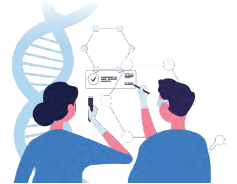
If you have been diagnosed with a rare neurological condition, would you want to know if it could be passed on to your children? Neurologists heading NNI‘s Genetics Services Clinic explain how this new service provides holistic management of hereditary neurological conditions.
Launched in September 2020, the Genetic Services clinic offers genetic testing to patients and even family members, on top of the usual neuroscience care NNI provides to help them manage their condition. These genetic tests determine if a patient’s condition was likely caused by a faulty gene, the likelihood of passing the gene on to their children and if healthy family members also carry the gene and are at risk of developing the disease.
Who should get tested
Clinicians usually recommend that the extended family gets tested for the gene if more than one family member has been diagnosed with the same condition, because this is a sign of a genetic cause. This would include siblings and children of siblings, whether they are already showing symptoms or not. However, each patient and family member must decide whether or not to proceed with testing, based on their own unique circumstances and priorities.
“We notice a difference in attitude towards genetic disease among younger and middle-aged patients compared with patients who are older. While generalisations cannot be made, younger and middle-aged patients usually decide to go ahead with genetic testing because knowing the results may affect their family planning decisions and help them better understand the disease including how it will likely progress” observed Dr Chen Zhiyong, Consultant, Neurology and the programme lead at NNI @ Tan Tock Seng Hospital campus.
Why get tested
With the advancement in technology, new treatments and options for reproduction are now available. Knowing if you have the condition and if it can be passed to your children allows you to take the necessary action and make plans that are best for you and your family.
“10 to 15 years ago, knowing you had a genetic condition may not have changed anything. But today, we have more solutions to offer patients and these solutions have become more accessible and affordable,” shared Dr Kaavya Narasimhalu, Consultant, Neurology and the programme lead at NNI @ Singapore General Hospital campus.
This article was published in the National Neuroscience Institute's NeusLink magazine, which covers articles about NNI updates and brain, spine, muscle and nerve conditions in English and Chinese - to read more articles click here!
Check out another related article:
Get the Health Buddy App
© 2025 SingHealth Group. All Rights Reserved.













 Get it on Google Play
Get it on Google Play